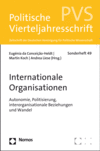By Lenz, Tobias, Jeanine Bezuijen, Liesbet Hooghe, and Gary Marks

This paper surveys fundamental contrasts in the articulation of international authority using a new dataset, constructed by the authors, estimating the composition and decision-making rules of 72 international organizations from 1950 to 2010. We theorize that two modes of governance – general purpose and task specific – represent distinctive ways of organizing political life, and this has stark implications for the exercise of international authority. In the spirit of this special issue, we engage theoretical perspectives that bridge rational and constructivist approaches to examine how general purpose and task specific international organizations exhibit systematic differences in their institutional configuration, delegation, pooling, and development.

» The paper was previously published as a working paper in the Robert Schuman Centre for Advanced Studies (RSCAS) Working Paper Series of the European University Institute (No. 2014/128). Access here.
Published:
2014